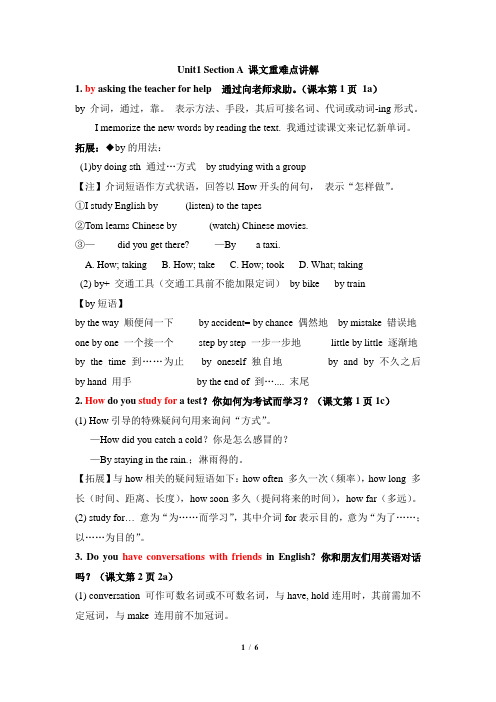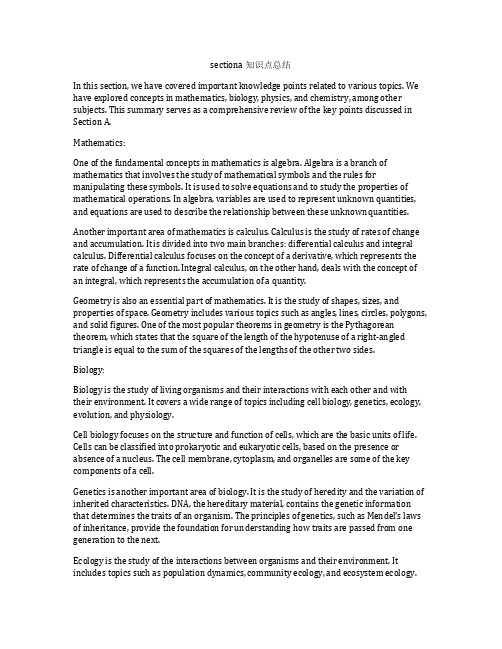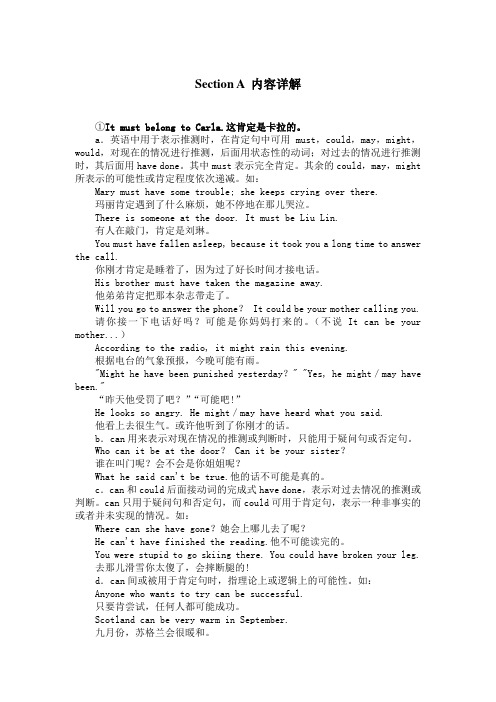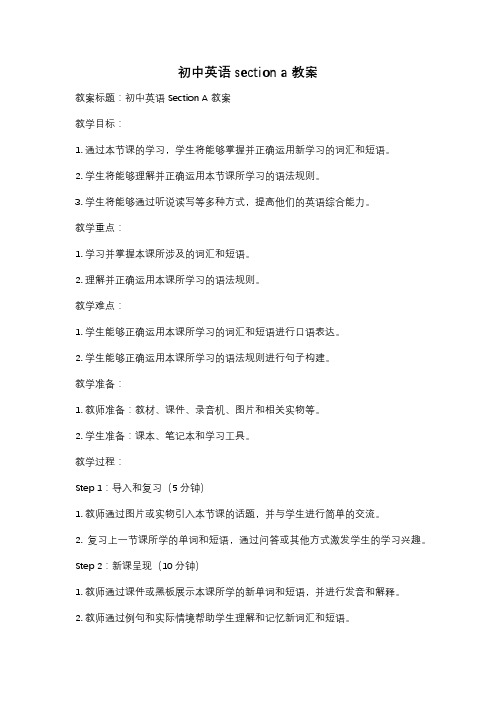Section A
Section A知识点

Section A知识点击1.0h,do you want to sing Chinese songs or English songs? 哦,你想唱中文歌曲还是英文歌曲?此句是选择疑问句,即提供两种或两种以上情况以供对方选择。
(1)基本结构:一般疑问句+or+对照选择项。
如:Do you like tea or milk? 你喜欢茶还是牛奶?特殊疑问句+A选择项+or+ B选择项。
如:When can you come back,today or tomotow?你什么时候能回来,今天还是明天?(2)用法:选择疑问句不用Yes或No来回答,一般情况下是就供选择的两项或三项中的一项进行回答。
如:—Are you a teacher or a worker?你是教师还是工人?—I am a worker.我是工人。
—Which do you like,football or basketball?足球和篮球你喜欢哪一项?—I like ffootball.我喜欢足球。
2.I’d love to.But I can’t sing Chinese songs.I can only sing English songs.我非常乐意,但是我不会唱中文歌曲。
我只会唱英文歌曲。
Can表示能力,是情态动词,没有人称和数的变化。
其句式结构为:(1)陈述句:主语+can/can’t+谓语动词+其他。
如:I can play the piano,but I can’t play the guitar.我会弹钢琴,但我不会弹吉他。
(2)一般疑问句:Can+主语+动词原形+其他?如:Can you sing an English song?你能唱首英文歌吗?(3)特殊疑问句:疑问代词/疑问副词+can+动词原形+其他?如:What can he do at the meeting?他在会议上能做什么呢?【拓展】在日常生活中can还可表示“许可,容许”的意思。
Section A 知识点解析

Section A 知识点解析语言目标·提供帮助图片译文:——我想到外面去工作。
——你可以帮助清扫城市公园。
1a 看布告栏读一读你有什么方法帮助其他人。
然后,列出你能想出的其他方法。
你可以帮助他人的其他方法______1b 听录音并完成句子。
1.我愿意在外面______。
你可以帮助打扫______城市公园2.我愿意______无家的人们。
你可以在食品发放站______食物给他们。
3.我愿意让有病的孩子快乐______。
你可以在医院______他们。
4.我愿意帮助孩子们______他们校内工作,你可以在课后学习小组______。
1c 结对练习。
练上面图片里的对话。
用1b中的句型编类似的对话。
答案:1b 1.work;up 2.help;out 3.up;visit 4.with;volunteer 2a 一组同学正在计划安排街心花园清扫日。
他们正在告诉大家这一活动。
听录音,划出你听到的他们要做什么。
2b 再听一遍。
完成表格。
1.我们需要拟订出一个计划。
2.我们不能______计划。
清扫日距现在只有两周了。
3.我将要______我们的想法。
4.我们可以______标牌。
5.我放学后将要______广告。
6.我们每人能______10个人,让他们来参加。
2c 结对练习。
分角色练2b的对话。
A:我们需要想出一个计划。
B:让我们先吃午饭吧!A:不,我们不能推迟计划。
清扫日距现在只有两周了。
2b 1.come up with 2.put off 3.write down 4.put up 5.hand out 6.call up1.clean v.打扫clean up清理;使清洁或有秩序例:The waiter hurried to clean up the pieces of the broken plates.服务员赶紧把盘碟的碎片打扫干净。
c1ean out使……耗尽资源例:We clean out of food and drinks and the stores are shut.我们的食品和饮料都已吃光了,而商店又关了门。
九年级英语人教版全册Unit1--Section--A--课文重难点讲解

Unit1 Section A 课文重难点讲解1. by asking the teacher for help 通过向老师求助。
(课本第1页1a)by 介词,通过,靠。
表示方法、手段,其后可接名词、代词或动词-ing形式。
I memorize the new words by reading the text. 我通过读课文来记忆新单词。
拓展:◆by的用法:(1)by doing sth 通过…方式by studying with a group【注】介词短语作方式状语,回答以How开头的问句,表示“怎样做”。
①I study English by _____(listen) to the tapes②Tom learns Chinese by ______(watch) Chinese movies.③—____ did you get there? —By ___ a taxi.A. How; takingB. How; takeC. How; tookD. What; taking(2) by+ 交通工具(交通工具前不能加限定词)by bike by train【by短语】by the way 顺便问一下by accident= by chance 偶然地by mistake 错误地one by one 一个接一个step by step 一步一步地little by little 逐渐地by the time 到……为止by oneself 独自地by and by 不久之后by hand 用手by the end of 到….... 末尾2. How do you study for a test?你如何为考试而学习?(课文第1页1c)(1) How引导的特殊疑问句用来询问“方式”。
—How did you catch a cold?你是怎么感冒的?—By staying in the rain.;淋雨得的。
新版英语Section A读写-课件

Section A
16.how long 多长 17.the ancient emperors 古代帝王 18.the main reason 主要原因 19.manmade objects 人造物体 20.part of ……的一部分
Section A
21.one of the world's most dangerous sports 世界上最危险的运动之一
• 不习惯读书进修的人,常会自满于现状,觉得没有什么事情需要学习,于是他们不进则退2022年4月30日星期六下午6时8分9秒18:08:0922.4.30 • 读书,永远不恨其晚。晚比永远不读强。2022年4月下午6时8分22.4.3018:08April 30, 2022 • 正确的略读可使人用很少的时间接触大量的文献,并挑选出有意义的部分。2022年4月30日星期六6时8分9秒18:08:0930 April 2022 • 书籍是屹立在时间的汪洋大海中的灯塔。
Section A
31.one of the main reasons 主要原因之一 32.challenge oneself 挑战自己 33.the spirit of ……的精神 34.achieve one's dream 实现梦想 35.the forces of nature 自然的力量
谢谢观赏
You made my day!
3.在今天的长城游中,大家尽管问我任何问题,不要拘束。 Feel free to ask me anything on today's Great Wall tour.
Section A
4.主要原因是为了保护他们那部分的国土。 The main reason was to protect their part of the country.
sectiona知识点总结

sectiona知识点总结In this section, we have covered important knowledge points related to various topics. We have explored concepts in mathematics, biology, physics, and chemistry, among other subjects. This summary serves as a comprehensive review of the key points discussed in Section A.Mathematics:One of the fundamental concepts in mathematics is algebra. Algebra is a branch of mathematics that involves the study of mathematical symbols and the rules for manipulating these symbols. It is used to solve equations and to study the properties of mathematical operations. In algebra, variables are used to represent unknown quantities, and equations are used to describe the relationship between these unknown quantities. Another important area of mathematics is calculus. Calculus is the study of rates of change and accumulation. It is divided into two main branches: differential calculus and integral calculus. Differential calculus focuses on the concept of a derivative, which represents the rate of change of a function. Integral calculus, on the other hand, deals with the concept of an integral, which represents the accumulation of a quantity.Geometry is also an essential part of mathematics. It is the study of shapes, sizes, and properties of space. Geometry includes various topics such as angles, lines, circles, polygons, and solid figures. One of the most popular theorems in geometry is the Pythagorean theorem, which states that the square of the length of the hypotenuse of a right-angled triangle is equal to the sum of the squares of the lengths of the other two sides.Biology:Biology is the study of living organisms and their interactions with each other and with their environment. It covers a wide range of topics including cell biology, genetics, ecology, evolution, and physiology.Cell biology focuses on the structure and function of cells, which are the basic units of life. Cells can be classified into prokaryotic and eukaryotic cells, based on the presence or absence of a nucleus. The cell membrane, cytoplasm, and organelles are some of the key components of a cell.Genetics is another important area of biology. It is the study of heredity and the variation of inherited characteristics. DNA, the hereditary material, contains the genetic information that determines the traits of an organism. The principles of genetics, such as Mendel's laws of inheritance, provide the foundation for understanding how traits are passed from one generation to the next.Ecology is the study of the interactions between organisms and their environment. It includes topics such as population dynamics, community ecology, and ecosystem ecology.The concept of the food chain and the energy flow within ecosystems are important aspects of ecology.Physics:Physics is the study of the fundamental forces and properties of the universe. It covers a wide range of topics including mechanics, thermodynamics, electromagnetism, and quantum mechanics.Mechanics is the branch of physics that deals with the motion and forces of objects. It includes topics such as kinematics, which describes the motion of objects, and dynamics, which studies the forces acting on objects.Thermodynamics is the study of heat and energy. It includes topics such as the laws of thermodynamics, which describe the behavior of energy in various systems, and the concept of entropy, which measures the amount of disorder in a system.Electromagnetism is the study of the relationship between electricity and magnetism. It includes topics such as electric fields, magnetic fields, and electromagnetic waves. The principles of electromagnetism are the foundation for understanding the behavior of electric circuits and the generation of electromagnetic radiation.Chemistry:Chemistry is the study of matter and the changes it undergoes. It covers a wide range of topics including the structure of atoms, chemical bonding, chemical reactions, and the properties of elements and compounds.The structure of atoms is an important concept in chemistry. Atoms are made up of protons, neutrons, and electrons. The number of protons determines the identity of an element, while the number of electrons determines its chemical properties.Chemical bonding is the process by which atoms combine to form molecules and compounds. There are different types of chemical bonds, including ionic bonds, covalent bonds, and metallic bonds, each with its own unique properties.Chemical reactions involve the breaking and forming of chemical bonds. They can be classified into various types, such as synthesis reactions, decomposition reactions, and redox reactions. The principles of stoichiometry and the concept of balancing chemical equations are essential for understanding chemical reactions.Summary:In summary, the knowledge points covered in Section A include important concepts in mathematics, biology, physics, and chemistry. These concepts provide a foundation for understanding the fundamental principles of each subject and serve as the basis for further study and application. By mastering these knowledge points, students can gain a strongunderstanding of the topics covered and be well-prepared for future learning and problem-solving.。
Section A

Practice
(5 minutes)
1. Group work
2. Group work
3. Group work
4. Pair work and
individual work
5. The whole
class work
5. Recite the rules in a
chant. Students can dance to the rhythm.
6. Fill in the blanks
according to the chant. Students can work in groups.
7. Check and revise the
1. The whole
class work
2. The whole
class work and
individual
Work
3. The whole
class work andgroup work
4. The whole
class work
1. Focus their attention
on the teacher.
share in the class.
5. Students read after the
tape sentence by sentence.
6. Students read 1b by
themselves, and group leaders check and help group members.
Consolidation
(15 minutes)
1.Individual
Section A 内容详解

Section A 内容详解①It must belong to Carla.这肯定是卡拉的。
a.英语中用于表示推测时,在肯定句中可用must,could,may,might,would,对现在的情况进行推测,后面用状态性的动词;对过去的情况进行推测时,其后面用have done。
其中must表示完全肯定。
其余的could,may,might 所表示的可能性或肯定程度依次递减。
如:Mary must have some trouble; she keeps crying over there.玛丽肯定遇到了什么麻烦,她不停地在那儿哭泣。
There is someone at the door. It must be Liu Lin.有人在敲门,肯定是刘琳。
You must have fallen asleep, because it took you a long time to answer the call.你刚才肯定是睡着了,因为过了好长时间才接电话。
His brother must have taken the magazine away.他弟弟肯定把那本杂志带走了。
Will you go to answer the phone? It could be your mother calling you.请你接一下电话好吗?可能是你妈妈打来的。
(不说It can be your mother...)According to the radio, it might rain this evening.根据电台的气象预报,今晚可能有雨。
"Might he have been punished yesterday?" "Yes, he might/may have been."“昨天他受罚了吧?”“可能吧!”He looks so angry. He might/may have heard what you said.他看上去很生气。
初中英语section a教案

初中英语section a教案教案标题:初中英语 Section A 教案教学目标:1. 通过本节课的学习,学生将能够掌握并正确运用新学习的词汇和短语。
2. 学生将能够理解并正确运用本节课所学习的语法规则。
3. 学生将能够通过听说读写等多种方式,提高他们的英语综合能力。
教学重点:1. 学习并掌握本课所涉及的词汇和短语。
2. 理解并正确运用本课所学习的语法规则。
教学难点:1. 学生能够正确运用本课所学习的词汇和短语进行口语表达。
2. 学生能够正确运用本课所学习的语法规则进行句子构建。
教学准备:1. 教师准备:教材、课件、录音机、图片和相关实物等。
2. 学生准备:课本、笔记本和学习工具。
教学过程:Step 1:导入和复习(5分钟)1. 教师通过图片或实物引入本节课的话题,并与学生进行简单的交流。
2. 复习上一节课所学的单词和短语,通过问答或其他方式激发学生的学习兴趣。
Step 2:新课呈现(10分钟)1. 教师通过课件或黑板展示本课所学的新单词和短语,并进行发音和解释。
2. 教师通过例句和实际情境帮助学生理解和记忆新词汇和短语。
Step 3:语法讲解(15分钟)1. 教师通过课件或黑板讲解本节课所学的语法规则,并提供相关例句进行解释。
2. 教师通过练习题和实例引导学生进行语法规则的运用和巩固。
Step 4:听说训练(15分钟)1. 教师播放录音,并要求学生跟读和模仿录音中的对话和句子。
2. 教师组织学生进行小组讨论或角色扮演,运用所学的词汇和语法进行口语练习。
Step 5:阅读训练(15分钟)1. 教师组织学生进行课文阅读,然后提问相关问题,检查学生对课文的理解程度。
2. 教师指导学生进行阅读理解练习,巩固学生的阅读能力。
Step 6:写作训练(15分钟)1. 教师提供写作任务,并给予学生写作指导和范文示范。
2. 学生按照要求进行写作练习,并互相交流和修改作文。
Step 7:作业布置和小结(5分钟)1. 教师布置相关的课后作业,巩固学生对本节课所学内容的掌握。
sectionA .ppt

导入
预习
小结 写作
Back
charm charming son-in-law caring indication confirm citizenship suspect harsh
vt. / n. 使陶醉 / [U] 魅力; 吸引力 a. 迷人的; 有魅力的 n. [C] 女婿 a. 体贴的 n. [C, U] 迹象
新视野 - 短 语 应 用
导入
预习
课文 写作
Back
怀着······的愿望:
• harbor a wish for
对长·期···遭··抱到不继切母实的际虐的待想, 短 • harbor unrealistic notions
语 about
法男:孩对她心怀怨恨。
逆
译 • harbor a deep love for
新视野 - 短 语 应 用
导入
预习
课文 写作
Back
为情对所··困···者·着很迷难: 做到 理性忙思于考··。····:
为······所困:
为······所动:
短 • to be obsessed with 语 • to be occupied with
逆
译 • to be seized / cursed with • to be touched with
短语应用
Back
意群提示
This group of young people, desirous of fadmeseiraonuds owfefaalmthe, taonodkweveearltyho/ctcaakseioenvetory doecmcaosnisotnra/tdeetmheomnssterlavtees.oneself
sectionA课文翻译

UNIT1我哥哥吉米出生时遇上难产,因为缺氧导致大脑受损。
两年后,我出生了。
从此以后,我的生活便围绕我哥哥转。
伴随我成长的,是“到外面去玩,把你哥哥也带上。
”不带上他,我是哪里也去不了的。
因此,我怂恿邻居的孩子到我家来,尽情地玩孩子们玩的游戏。
我母亲教吉米学习日常自理,比如刷牙或系皮带什么的。
我父亲宅心仁厚,他的耐心和理解使一家人心贴着心。
我则负责外面的事,找到那些欺负我哥哥的孩子们的父母,告他们的状,为我哥哥讨回公道。
父亲和吉米形影不离。
他们一道吃早饭,平时每天早上一道开车去海军航运中心,他们都在那里工作,吉米在那搬卸标有彩色代号的箱子。
晚饭后,他们一道交谈,玩游戏,直到深夜。
他们甚至用口哨吹相同的曲调。
所以,父亲1991年因心脏病去世时,吉米几乎崩溃了,尽管他尽量不表现出来。
他就是不能相信父亲去世这一事实。
通常,他是一个令人愉快的人,现在却一言不发,无论说多少话都不能透过他木然的脸部表情了解他的心事。
我雇了一个人和他住在一起,开车送他去上班。
然而,不管我怎么努力地维持原状,吉米还是认为他熟悉的世界已经消失了。
有一天,我问他:“你是不是想念爸爸?”他的嘴唇颤抖了几下,然后问我:“你怎么看,玛格丽特?他是我最好的朋友。
”接着,我俩都流下了眼泪。
六个月后,母亲因肺癌去世,剩下我一人来照顾吉米。
吉米不能马上适应去上班时没有父亲陪着,因此搬来纽约和我一起住了一段时间。
我走到哪里他就跟到哪里,他好像适应得很好。
但吉米依然想住在我父母的房子里,继续干他原来的工作。
我答应把他送回去。
此事最后做成了。
如今,他在那里生活了11年,在许多人的照料下,同时依靠自己生活得有声有色。
他已成了邻里间不可或缺的人物。
如果你有邮件要收,或有狗要遛,他就是你所要的人。
当然,母亲的话没错:可以有一个家,既能容纳他的缺陷又能装下我的雄心。
事实上,关照像吉米这样一个深爱又感激我的人,更加丰富了我的生活,其他任何东西都不能与之相比。
这一点,在9·11灾难后几天更显真切。
SectionA__课文重难点讲解

SectionA 课文重难点讲解1. Is this your pencil?这是你的铅笔吗?本句是由“be(am,is,are)动词+主语+表语”构成的一般疑问句。
一般疑问句是针对一种事物或情况是否属实而提出疑问的句子,回答时一般用yes或no 开头作简略回答。
含有be(am,is,are)动词的陈述句变为一般疑问句时,要把be动词提前,大写第一个字母,句末用问号。
读时通常用升调。
—Are you Nick?你是尼克吗?—Yes,I am./No,I'm not.是的,我是。
/不,我不是。
This is a book. →Is this a book?这是一本书。
这是一本书吗?【例1】This is my pencil box.(改为一般疑问句)______ ______ ______ pencil box?解析此题考查一般疑问句,即把be动词移至句首,首字母要大写,句末加问号。
注意语序及人称的变化。
答案Is this your【例2】______ bike is over there.A.This B.That C.this D.that解析题目中“over there”意为“在那边”,是远指,故需用指示代词that修饰bike;再者,句首开头第一个单词的首字母应该大写。
故应选B项。
答案B句意那辆自行车在那边。
本句是向别人提出请求、询问事情或打扰别人时常用的交际用语。
Excuse me. Which is the way to the hospital?请问,哪一条是去医院的路?Excuse me. Is this your book?打扰了,这是你的书吗?【例题】—______.How do you spell it?—P-E-N.A.Sorry B.Excuse meC.Thank you D.Hello解析向别人询问或请求帮助时,要先说“打扰你了”。
答案B句意——打扰了,你怎样拼写它?——P-E-N。
- 1、下载文档前请自行甄别文档内容的完整性,平台不提供额外的编辑、内容补充、找答案等附加服务。
- 2、"仅部分预览"的文档,不可在线预览部分如存在完整性等问题,可反馈申请退款(可完整预览的文档不适用该条件!)。
- 3、如文档侵犯您的权益,请联系客服反馈,我们会尽快为您处理(人工客服工作时间:9:00-18:30)。
八年级上册教案设计
Unit 2 Keeping Healthy
Topic 1 You should brush your teeth twice a day.
Section A
Ⅰ. Material analysis
本节课的主要活动为1a和2。
第二单元谈论如何保持健康。
话题一介绍了感冒、头疼等常见病的名称,出现了疾病名称的词:toothache, backache, fever, cough, headache, stomachache等以及相对应的短语:have a cold, have a fever, have a cough, have a headache, have a toothache, have a backache, have a stomachache等。
通过Kangkang 和Betty的对话,呈现了询问生病情况的对话:What’s wrong with you? I have a …等,以及表达关心所提的建议:You should…和You shouldn’t…。
本课的语法重点是You should…和You shouldn’t…。
语言功能方面要求学生学会用英语描述疾病并能就疾病征求他人意见、给他人提建议等。
要求学生能在课后用英语写一篇描述疾病并提出有益建议的文章。
Ⅱ. Teaching aims
Knowledge aims:
1. 能正确运用以下短语进行书面表达:
have a cold, have a fever, have a cough, have a headache, have a toothache,
have a backache, have a stomachache等。
2. 能正确地运用should, shouldn’t 提建议:
You should drink enough boiled water.
You shouldn’t drink coffee or tea in the evening.
Skill aims:
1. 能听懂有关日常小病的名称及相关话题。
2. 能熟练地运用should,shouldn’t针对日常小病提建议。
3. 能正确朗读介绍日常小病的对话或文章。
4. 能用should, shouldn’t 结合本单元短语描述日常生活小病并提出有益的建议。
Emotional aims:
通过语言学习,影响学生的自身品格,要学会信任他人、关心他人,为我们的健康生活创建友爱、和谐的氛围。
Ⅲ. The key points and difficult points
Key points:
have a cold, have a fever, have a cough, have a headache, have a toothache, have a backache, have a stomachache等短语的理解及运用。
Difficult points:
就日常小病用英语提建议。
Ⅳ. Learning strategies
1. 培养学生根据图片猜单词意思的能力。
2. 培养学生模仿已有例句造句的能力。
Ⅴ. Teaching aids
Computer multimedia projector, pictures of different illnesses
Everyday saying: Bitter pills may have wholesome effects. 良药苦口利于病。
Ⅵ. Teaching procedures
Ⅶ. Blackboard design。
